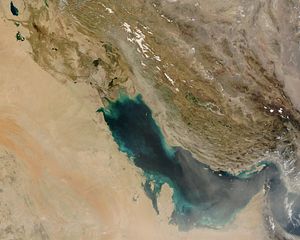Much remains murky about Tuesday’s Iranian stoppage and seizure of a Marshall Islands-flagged container ship in international waters. The seizure comes on the heels of a successful effort by the United States Navy to interdict an Iranian supply convoy destined for Yemen.
It is not certain at this point that the IRGC seizure of the Maersk vessel was intended as a direct response to the U.S. intervention, if it was part of an effort by the IRGC to scuttle the nuclear deal, if it represented a broader effort to test U.S. resolve, or if it was unrelated to the U.S. except by coincidence.
What we do know is that the effective U.S. guarantee of maritime security, and of freedom of the seas, has been made part of a bargaining dispute between the United States and Iran. Regardless of the reasons for the seizure, it now apparently represents a showdown in which both Iran and the United States have staked their credibility.
We can interrogate the usefulness of these sorts of contests while at the same time recognizing a contradiction at the heart of U.S. maritime efforts. The United States likes to characterize its approach to maritime security as positive-sum and value free. Even countries that differ with the U.S. on key points, such as Iran, Russia, and China, can benefit from securing maritime trade. Moreover, the Cooperative Strategy has given the states an opportunity, if not a responsibility, to contribute to maritime security.
At the same time, the United States reserves the right to pursue military use of the maritime sphere for its own advantage, and for the advantage of its allies. The justice of such advantage isn’t the point. The United States can undoubtedly explain why the interdiction of Yemen represents a contribution to maritime security, but it cannot expect every relevant audience to buy that explanation.
The United States has made freedom of navigation a core national interest, but it also has other interests, and there are situations in which the former suffers at the expense of the latter. And even when countries broadly recognize the value of free and open use of the sea for trade, different countries will disagree on specific military uses. At the same time, the very public and open commitment that the United States has made to maritime security makes such conflicts awkward.
Finally, as Iran has surely noticed, it can take advantage of the U.S. commitment to maritime security, and of the paramount position of the United States in that effort, to tweak Washington. In short, when maritime freedom is associated with, and guaranteed by, a single major power, it has the potential to become a chip in the parochial disputes involving that power. This, at least, is a problem that could ease as the reach and power of other navies increases. Someday, we may be able to look at the seizure of a Marshall Islands-flagged ship and dismiss it as “China’s problem.”

































